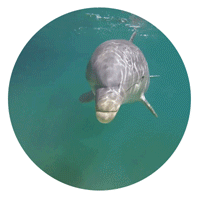Discover our marine mammals
Watch and interact with two of the most fascinating marine mammals in the world
Marine mammals represent a family of vertebrate animals that is very diverse in terms of shape, structure and adaptation. This includes cetaceans (whales, dolphins and porpoises), sirenia (manatees) and certain carnivores such as pinnipeds (seals and sea lions, among others), polar bears and sea otters.
At the Interactive Aquarium Cancun, you can observe and interact with the curious and beloved bottlenose dolphin (Tursiops truncatus).
- Dolphin
- Dolphin

Bottlenose Dolphin
Tursiops truncates
The bottlenose dolphin is just one of 37 species of dolphins (Delphinidae family). It is found in temperate and tropical waters around the world and lives in coastal and open water ecosystems, as well as in estuaries and, occasionally, in rivers.
Its diet consists of fish, mollusks and crustaceans, and although it has about 100 teeth, it swallows its food without chewing it. It consumes an average of 8 to 15 kg per day, depending on its gender, age and reproductive condition.
Bottlenose dolphins are social animals which means that they generally swim in groups or "alliances" to make getting food easier, to reproduce or fend off.
Facts & information
- Habitat: They live in tropical waters and other warm waters around the world.
- Length: 2.7 meters on average (106 In.)
- Weight: 200 kg on average (441 lbs.)
- Type of animal: vertebrate
- Fun Fact: Dolphins can reach speeds of approximately 30 km/h (18.6 m/h).

